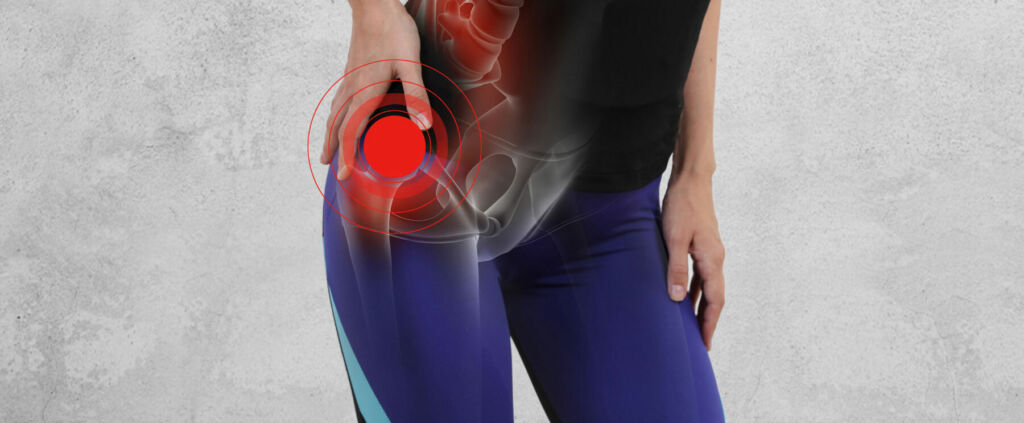Hip Pain & Injury Treatment Options
As the body’s largest ball-and-socket joint, the hip is built to handle repetitive motion and withstand significant stress. However, over time, factors like aging and overuse can wear down the cartilage, exhaust the muscles, and weaken the tendons. Sudden injuries, such as traumatic falls, can also result in hip fractures. These issues can lead to pain that disrupts everyday activities and limits athletic performance.
Hip injuries affect people of all ages. Young athletes may suffer from overuse or trauma, while older adults often face weakened hip joints and an increased risk of falls. At Access Sports Medicine, we focus on identifying the root cause of hip pain and providing the least invasive treatment options to help restore function and alleviate discomfort.

Common Causes of Hip Pain and Injuries
- Arthritis: Arthritis, especially osteoarthritis, occurs when hip cartilage wears down, causing pain and stiffness.
- Femoral Acetabular Impingement (FAI): FAI happens when abnormal hip bone structure causes joint friction, leading to pain and stiffness. It can result in arthritis or labral tears if not treated.
- Bursitis: Bursitis is inflammation of the hip’s bursae, causing sharp pain on the outer hip due to repetitive motion. Rest and anti-inflammatory treatments can help.
- Iliotibial Band Syndrome: ITBS occurs when the iliotibial band becomes tight, leading to hip and knee pain, particularly in athletes.
Tendinitis: Hip tendinitis is caused by overuse, leading to tendon inflammation and pain. Without treatment, it can become a chronic issue. - Labral Tears: Labral tears damage the cartilage around the hip socket, causing pain and reduced motion.
- Bone Fractures: Hip fractures result from trauma or falls, especially in older adults, causing severe pain and requiring surgery.
- Cartilage Damage: Cartilage damage leads to pain and stiffness in the hip. Over time, this can cause arthritis and joint dysfunction.
Hip injuries can affect the joint or surrounding muscles and ligaments, and some can become chronic due to wear and tear. Early treatment is key to preventing long-term issues.
Diagnosing Hip Pain: When to Seek Treatment
The first step in evaluating hip pain is identifying its cause. Did it result from sudden trauma, or has it gradually developed or worsened over time? A physical examination is essential to assess the hip joint’s function and detect any abnormalities or deficits.
In addition, your physician may order imaging tests like X-rays, MRIs, or ultrasounds to get a clearer picture of the hip joint and pinpoint the exact cause of the pain.
A seemingly minor issue can become more serious if left untreated. If hip pain persists after rest, it’s important to have it evaluated to determine the injury’s severity and the best course of treatment.
Effective Treatments for Hip Pain and Injury

Non-Surgical Hip Pain Treatment
The severity of the hip pain will determine the exact course of non-surgical hip pain treatment, but many orthopaedic hip injuries can be successfully treated with:
- Anti-inflammatory medications
- Temporary changes in activity
- Biologics and injections
- Physical therapy
- Exercise to strengthen leg muscles
- RICE (rest, ice, compression, elevation)
Arthroscopic Hip Surgery for Severe Hip Injuries
For hip pain and injuries that can’t be solved non-surgically, hip arthroscopy is a minimally invasive surgical option. In hip arthroscopy, the joint is accessed through small incisions, and an arthroscope (small camera) is inserted to take images. The surgeon then uses the images to guide miniature surgical instruments.
Hip arthroscopy can be used to treat many conditions including:
- Labral tears – a tear in the cushioning of the joint.
- Synovitis – inflamed tissues that surround the hip joint.
- Snapping hip syndrome – when a tendon rubs across the outside of a joint.
- Femoroacetabular impingement (FAI) – a condition where an extra bone develops along the acetabulum or the femoral head.
Take Control of Your Hip Pain—Get Started Today!
Ready to take the first step towards relief? Contact Access Sports Medicine today to schedule your consultation for personalized hip pain and injury treatment options. Let our team help you regain your mobility and get back to the activities you love!
Why Choose Access Sports Medicine?
Experienced Team: Our physicians are specialists in sports medicine and orthopedic care.
Comprehensive Care: From diagnosis to treatment and rehabilitation, we offer everything you need under one ro of.
Personalized Approach: Your treatment plan is tailored to your specific needs and goals.
Convenient Locations: We have clinics throughout New Hampshire to serve you.
